Did Yeshua Take A Nazarite Vow (in Matt. 26:29)?
Published by Rob Skiba June 3, 2014 at 2:10 AM
Before I begin this note, let me just say up front that I am asking this question myself:
Did Yeshua Take A Nazarite Vow?
I am going to suggest that He did. Based on my acknowledged limited understanding, please allow me to SPECULATE…
The Levitical Priesthood has been and will remain done away with so long as the Melchizedek Priesthood remains intact. In Hebrews 4 – 8, we see the differences between the two orders and see that the Levitical order had failed… miserably.
Hebrews 4:
14 Seeing then that we have a great high priest, that is passed into the heavens, Jesus the Son of God, let us hold fast our profession.
15 For we have not an high priest which cannot be touched with the feeling of our infirmities; but was in all points tempted like as we are, yet without sin.
16 Let us therefore come boldly unto the throne of grace, that we may obtain mercy, and find grace to help in time of need.
Hebrews 5:1 For every high priest taken from among men is ordained for men in things pertaining to God, that he may offer both gifts and sacrifices for sins:
Hebrews 6:20 Whither the forerunner is for us entered, even Jesus, made an high priest for ever after the order of Melchisedec.
Yeshua did many things prior to His Passion, but He did not offer sacrifice for sin until He offered HIMSELF. But in order to do that, he would have to be “a high priest taken from among men” and “ordained in things pertaining to God.” Only someone from the tribe of Levi could be a priest, authorized to make sacrifices.
Hebrews 7:5 And verily they that are of the sons of Levi, who receive the office of the priesthood, have a commandment to take tithes of the people according to the law, that is, of their brethren, though they come out of the loins of Abraham:
The office of the priesthood belonged to the sons of Levi. But we see in Hebrews that the Levitical priesthood was flawed:
Hebrews 7:
11 If therefore perfection were by the Levitical priesthood, (for under it the people received the law,) what further need was there that another priest should rise after the order of Melchisedec, and not be called after the order of Aaron?
12 For the priesthood being changed, there is made of necessity a change also of the law.
13 For he of whom these things are spoken pertaineth to another tribe, of which no man gave attendance at the altar.
14 For it is evident that our Lord sprang out of Juda; of which tribe Moses spake nothing concerning priesthood.
Here Paul (who I believe wrote Hebrews) states that Moses wrote nothing of any priest coming out of Judah. None but the Levite gave attendance at the altar of YHWH. However, a non-Levite could do priestly duties by taking a Nazarite vow. This then begs the question (which came up in our Torah study this past weekend as we studied Numbers 6), did Yeshua take a Nazarite vow in order to be able to attend the altar, offering Himself as a sacrifice for us? It appears to me that He did. If so, it takes an “oath” to make one a priest. Consider:
Hebrews 7:20 And inasmuch as not without an oath he was made priest:
Now, I know this passage continues with a call back to a prophecy in Psalms, and an oath made by YHWH Himself, but I wonder if Yeshua didn’t also make an oath of His own. If so, when did He initiate the vow and why? I suspect that IF He did take a Nazarite vow, He did so at the Passover Meal many refer to as the Lord’s Supper, when He said:
Matthew 26:29 But I say unto you, I will not drink henceforth of this fruit of the vine, until that day when I drink it new with you in my Father’s kingdom.
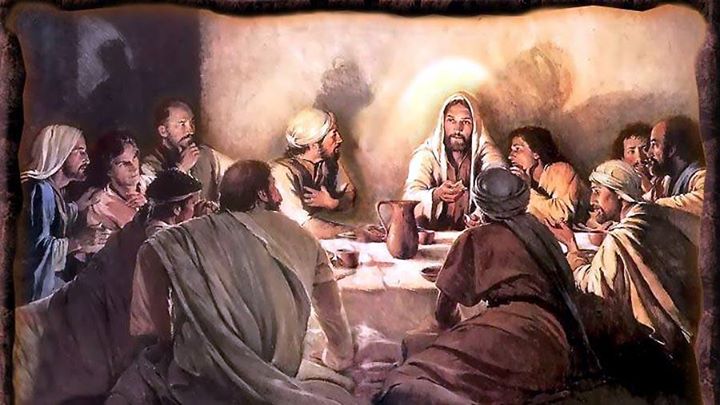
This sounds a LOT like a Nazarite vow. Why else would He say this? Consider what Numbers 6 has to say:
Numbers 6:
1 And the Lord spake unto Moses, saying,
2 Speak unto the children of Israel, and say unto them, When either man or woman shall separate themselves to vow a vow of a Nazarite, to separate themselves unto the Lord:
3 He shall separate himself from wine and strong drink, and shall drink no vinegar of wine, or vinegar of strong drink, neither shall he drink any liquor of grapes, nor eat moist grapes, or dried.
4 All the days of his separation shall he eat nothing that is made of the vine tree, from the kernels even to the husk.
5 All the days of the vow of his separation there shall no razor come upon his head: until the days be fulfilled, in the which he separateth himself unto the Lord, he shall be holy, and shall let the locks of the hair of his head grow.
6 All the days that he separateth himself unto the Lord he shall come at no dead body.
7 He shall not make himself unclean for his father, or for his mother, for his brother, or for his sister, when they die: because the consecration of his God is upon his head.
8 All the days of his separation he is holy unto the Lord.
Knowing full well that He would rise from the dead three days later, and that He would stick around for more than a month thereafter, why not drink wine again during the end of His first visitation? Why put it off until the Millennial Kingdom? I SUSPECT that He took this vow in order to set Himself apart for what is usually priestly duty – specifically that of sacrifice.
He was about to sacrifice HIMSELF as the sinless Passover Lamb that would take away the sins of the world. We learn later, in the book of Hebrews that He has become our High Priest in the Order of Melchizedek.
Hebrews 7:
25 Wherefore he is able also to save them to the uttermost that come unto God by him, seeing he ever liveth to make intercession for them.
26 For such an high priest became us, who is holy, harmless, undefiled, separate from sinners, and made higher than the heavens;
27 Who needeth not daily, as those high priests, to offer up sacrifice, first for his own sins, and then for the people’s: for this he did once, when he offered up himself.
28 For the law maketh men high priests which have infirmity; but the word of the oath, which was since the law, maketh the Son, who is consecrated for evermore.
I must stop here and stress that I believe our English Bible translators INSERTED the wrong word into verses 7 and 13 of Hebrews 8. Consider:
Hebrews 8
1 Now of the things which we have spoken this is the sum: We have such an high priest, who is set on the right hand of the throne of the Majesty in the heavens;
2 A minister of the sanctuary, and of the true tabernacle, which the Lord pitched, and not man.
The writer begins by saying that he is summarizing what he had previously stated, which from Hebrews 4 forward to this point was all about the better priesthood of the Melchizedec order!
Hebrews 8:
3 For every high priest is ordained to offer gifts and sacrifices: wherefore it is of necessity that this man have somewhat also to offer.
4 For if he were on earth, he should not be a priest, seeing that there are priests that offer gifts according to the law:
5 Who serve unto the example and shadow of heavenly things, as Moses was admonished of God when he was about to make the tabernacle: for, See, saith he, that thou make all things according to the pattern shewed to thee in the mount.
6 But now hath he obtained a more excellent ministry, by how much also he is the mediator of a better covenant, which was established upon better promises.
7 For if that first PRIESTHOOD had been faultless, then should no place have been sought for the second.
8 For finding fault with THEM, he saith, Behold, the days come, saith the Lord, when I will make a new covenant with the house of Israel and with the house of Judah:
9 Not according to the covenant that I made with their fathers in the day when I took them by the hand to lead them out of the land of Egypt; because they continued not in my covenant, and I regarded them not, saith the Lord.
10 For this is the covenant that I will make with the house of Israel after those days, saith the Lord; I will put my laws into their mind, and write them in their hearts: and I will be to them a God, and they shall be to me a people:
11 And they shall not teach every man his neighbour, and every man his brother, saying, Know the Lord: for all shall know me, from the least to the greatest.
12 For I will be merciful to their unrighteousness, and their sins and their iniquities will I remember no more.
13 In that he saith, A new PRIESTHOOD, he hath made the first old. Now that which decayeth and waxeth old is ready to vanish away.
The word “covenant” is INSERTED into our Bibles by the translators. It is in italics in the KJV for this reason. I submit to you that if the “sum” of the previous 4 chapters is the subject of this chapter then PRIESTHOOD is a better word to insert in verses 7 and 13. Not just for the context, but also for the fact that the “New Covenant” involves the Law being written on our heart and mind, which is the subject of verse 10. If verse 13 were to include “covenant” it would nullify the whole point of verse 10. No. It was the Levitical priesthood, which involved men who “waxed old” and contiually died off. Recall:
Hebrews 7:
23 And they truly were many priests, because they were not suffered to continue by reason of death:
24 But this man, because he continueth ever, hath an unchangeable priesthood.
There were many Levitical priests because they were mortal and only had limited lifespans. But Yeshua is one Priest who lives forever! Furthermore, Moses, David and others referred to the Law as good and perfect and just. So, how can something described as such be considered “faulty” as most of our Bibles imply by inserting the word “covenant” into Hebrews 8:7? It was the PEOPLE who were faulty as even evidenced in the following verse where it says “For finding fault with THEM” (i.e. the priests).
Again, I’m just thinking out loud here… Yeshua serves in the capacity of our High Priest, Mediator and final sacrifice until the Millennial Kingdom, when it will no longer be necessary to serve in that capacity. Why do I say “no longer necessary” at that time? Well, for one thing, it’s all over by then. But also, because we do see the prophets talking about Levitical offerings/sacrifices once again during the Millennial Kingdom:
Isaiah 66:
20 And they shall bring all your brethren for an offering unto the Lord out of all nations upon horses, and in chariots, and in litters, and upon mules, and upon swift beasts, to my holy mountain Jerusalem, saith theLord, as the children of Israel bring an offering in a clean vessel into the house of the Lord.
21 And I will also take of them for priests and for Levites, saith the Lord.
22 For as the new heavens and the new earth, which I will make, shall remain before me, saith the Lord, so shall your seed and your name remain.
Zechariah 14:
16 And it shall come to pass, that every one that is left of all the nations which came against Jerusalem shall even go up from year to year to worship the King, the Lord of hosts, and to keep the feast of tabernacles.
17 And it shall be, that whoso will not come up of all the families of the earth unto Jerusalem to worship the King, the Lord of hosts, even upon them shall be no rain.
18 And if the family of Egypt go not up, and come not, that have no rain; there shall be the plague, wherewith the Lord will smite the heathen that come not up to keep the feast of tabernacles.
19 This shall be the punishment of Egypt, and the punishment of all nations that come not up to keep the feast of tabernacles.
20 In that day shall there be upon the bells of the horses, Holiness Unto The Lord; and the pots in the Lord’s house shall be like the bowls before the altar.
21 Yea, every pot in Jerusalem and in Judah shall be holiness unto the Lord of hosts: and all they that sacrifice shall come and take of them, and seethe therein: and in that day there shall be no more the Canaanite in the house of the Lord of hosts.
Why are Levitical priests brought back into service in the Millennial Kingdom?? I have always wondered about this. Of course, the Dispensationalist has all sorts of wacky ideas, but I’d like to throw out my own (wacky though they may also be): What if the Levitical priests and the Millennial sacrifices HAVE TO be brought back because of Yeshua’s vow?
Before exploring that question further, let’s revisit the possibility that He did take a Nazarite vow. We know from the Gospel accounts that Yeshua drank wine right up until He said He would not do so again for a specified period of time, during which He would BECOME a sacrifice. His words at that table certainly ring very true of a Nazarite vow, wherein a person who is NOT a Levite takes a vow of service to essentially Temple duty (like sacrificing) for a specified period of time and thus declares they will abstain from consuming anything grape related. In order for Yeshua to perform a sacrifice (in this case His own flesh), legally, He may have had to have taken the Nazarite vow. If there is one thing I have been learning these past 4 years, it is that YHWH STICKS TO HIS OWN LAWS! He operates within the legal framework He established.
ASSUMING Yeshua did take a Nazarite vow, it is very interesting to me that in Matthew 27, when offered a grape-related liquid at the cross, He did NOT drink it:
Matthew 27:34 They gave him vinegar to drink mingled with gall: and when he had tasted thereof, HE WOULD NOT DRINK.
Could it be that the Devil was trying to get Him to break His vow? If He would have drank, and if He DID take a Nazarite vow, that may have nullified the sacrifice being made. Again, just thinking out loud here, but it makes sense to me. Now consider again:
Numbers 6:8 All the days of his separation he is holy unto the Lord.
That verse is key to me. Of course Yeshua is Holy, because He is the Son of God. But He is further made Holy in His Divine “separation” for the cause of Temple service. He declared that His own body was a Temple, which once torn down, would be rebuilt in 3 days. The book of Hebrews declares He was the FINAL sacrifice. The sacrifice remains in effect until the end of the Tribulation, when His final act as the Lamb is to take vengeance on all who have rejected His sacrifice (the wrath of the Lamb in Revelation).
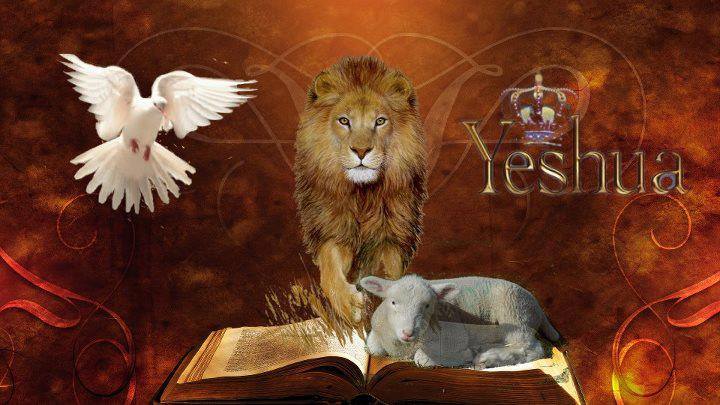
I think it is significant that in the book of Revelation, He is referred to as the Lamb nearly 30 times, but as the Lion only once. I submit this is because He is serving in that capacity until His vengeance is accomplished. Once that is done, His Nazarite/Melchizedec priestly work will be done and the set-apart sacrificial Lamb will then become the Lion (King). IF this theory is true, then it makes sense to me that He will conclude His Nazarite vow just as He promised: With a meal with His Bride, wherein He will celebrate with wine. But there is a legality in concluding such a vow. Upon completion of His service as a priest:
Numbers 6:9 And if any man die very suddenly by him, and he hath defiled the head of his consecration; then he shall shave his head in the day of his cleansing, on the seventh day shall he shave it.
On the “seventh day”?? This is just one of the many things that make me go, Hmmmmmm…. What is interesting about the condition requiring the head shaving though, is the notion that the Nazarite can become “defiled” by someone dying suddenly by them. Well, what happens just prior to the commencement of the Millennium? MILLIONS suddenly dying at the Messiah’s “mouth sword” in the final battle of Armageddon!
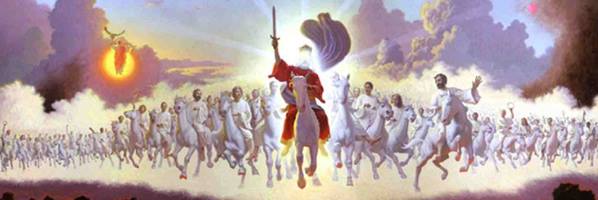
This would also terminate the vow. So, again, it APPEARS (to me anyway) that Yeshua took a Nazarite vow and will end it precisely as declared in the Law. What will happen next? Before He can eat and drink with His Bride…
Numbers 6:
18 And the Nazarite shall shave the head of his separation at the door of the tabernacle of the congregation, and shall take the hair of the head of his separation, and put it in the fire which is under the sacrifice of the peace offerings.
19 And the priest shall take the sodden shoulder of the ram, and one unleavened cake out of the basket, and one unleavened wafer, and shall put them upon the hands of the Nazarite, after the hair of his separation is shaven:
20 And the priest shall wave them for a wave offering before the Lord: this is holy for the priest, with the wave breast and heave shoulder: and after that the Nazarite may drink wine.
So, IF this theory is true, we will be dining with a bald Husband. That’s a bit different from what most are expecting, but I guarantee you He will not…
Numbers 6:10 And on the eighth day he shall bring two TURTLES, or two young pigeons, to the priest, to the door of the tabernacle of the congregation:
(He won’t be bringing lizards to the priest) 🙂
CONCLUSION:
OK. So IF Yeshua did indeed take a Nazarite vow at His last Passover Supper, His term of service will only conclude when He dines and drinks wine anew with us in the Kingdom. At which point, it would APPEAR (to me anyway) that He relinquishes the Melchizedek Priesthood BACK to that of the Levite and He then takes the throne (on earth) as King. That’s just a working theory I have at the moment, so don’t go nuts on me here guys. I cannot stress this enough – I’m just thinking out loud. IF this theory is true, I think it helps to explain why the Levitical stuff starts up again in the Millennium.
ASSUMING Yeshua did take a Nazarite vow, I find the chronology in Numbers interesting too. I do believe He did drink the cup of bitter waters (taking the curse of His adulterous Bride) in Numbers 5 See: Redeeming the Bride Part 2: Drinking the Cup. So, IF the above thesis is true, it’s really neat to see Him also take the Nazarite vow of Numbers 6 in order to accomplish what is in the previous chapter.
I might also add, IF this theory is true, it is SERIOUSLY damaging to the Pre-Trib Rapture thesis, wherein they’d have the Groom drinking wine prior to the proper conclusion to His Nazarite vow.
Some may argue that He could conclude His vow prior to the Battle of Armageddon, but if that’s true, why does Revelation describe the 6th Seal as the wrath of the LAMB as opposed to the Lion? If still in the capacity of the sacrificed Lamb, it would seem to me that He’s still acting as someone who had taken a Nazarite vow in order to remain that sacrificial Lamb who takes away our sins and to continue in the office of priesthood. And we also know He still has hair (Rev. 1:14) when He – as the Lamb – is on that white horse, so…
Here is something else I find interesting:
A person can become a Nazirite today whether or not the Temple in Jerusalem is standing. However, lacking the temple there is no way to bring the offerings that end the Nazirite period. Thus, the person would de facto be a permanent Nazirite – or at least until death anyway.
This may also explain why the sacrifices HAVE TO start back up again. For Yeshua to conclude His vow as He stated, thus being able to drink wine again with His Bride, the Temple and Levitical priesthood MUST be reinstated. Otherwise, He’d be a Nazarite for eternity and could never drink wine with us anew in the Kingdom.
OK, now I have repeatedly stated that I am just thinking out loud and used words like IF and ASSUMING and SPECULATING throughout note. So, don’t go psycho on me if you disagree. I want this to be a thread for open dialogue concerning this issue and not for division, strife and accusations of heresy and other such nonsense.
– Rob Skiba
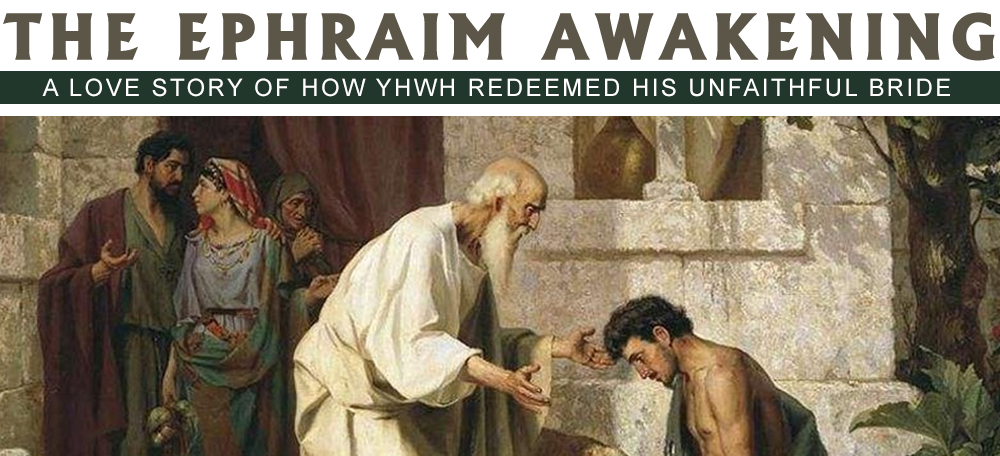

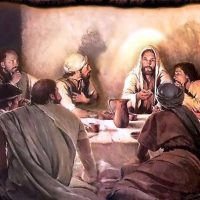

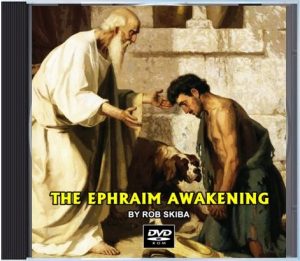


Leave a Reply